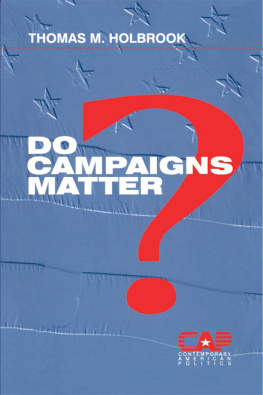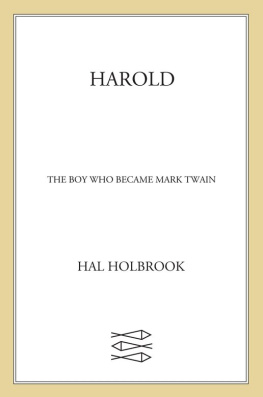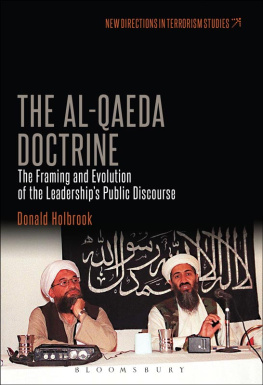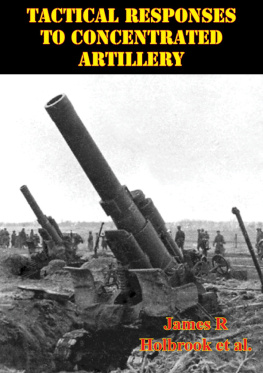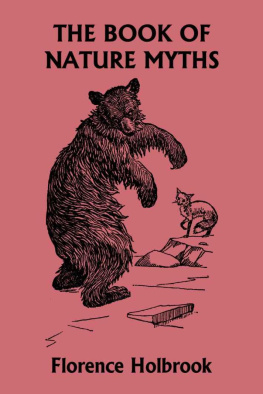DO CAMPAIGNS MATTER?
Contemporary American Politics
Series Editors
Richard G. Niemi, University of Rochester
Barbara Sinclair, University of California, Riverside
Editorial Board
John Aldrich, Duke University
Gregory Caldeira, The Ohio State University
Stanley Feldman, SUNY Stony Brook
Katherine Tate, The Ohio State University
Sue Thomas, Georgetown University
The Contemporary American Politics series is intended to assist students and faculty in the field of American politics by bridging the gap between advanced but oft-times impenetrable research on the one hand, but oversimplified presentations on the other. The volumes in this series represent the most exciting work in political sciencecutting-edge research that focuses on major unresolved questions, contradicts conventional wisdom, or initiates new areas of investigation. Ideal as supplemental texts for undergraduate courses, these volumes will examine the institutions, processes, and policy questions that make up the American political landscape.
Books in This Series
DO CAMPAIGNS MATTER?
Thomas M. Holbrook
GENDER DYNAMICS IN CONGRESSIONAL ELECTIONS
Richard Logan Fox
THOMAS M. HOLBROOK
DO CAMPAIGNS MATTER?
Copyright 1996 Sage Publications, Inc.
All rights reserved. No part of this book may be reproduced or utilized in any form or by any means, electronic or mechanical, including photocopying, recording, or by any information storage and retrieval system, without permission in writing from the publisher.
For information address:
 | SAGE Publications, Inc.
2455 Teller Road
Thousand Oaks, California 91320
E-mail:
SAGE Publications Ltd.
6 Bonhill Street
London EC2A 4PU
United Kingdom
SAGE Publications India Pvt. Ltd.
M-32 Market
Greater Kailash I
New Delhi 110 048 India |
Printed in the United States of America
Library of Congress Cataloging-in-Publication Data
Holbrook, Thomas M.
Do campaigns matter? / author, Thomas M. Holbrook.
p. cm. (Contemporary American politics)
Includes bibliographical references and index.
ISBN 0-8039-7344-6 (cloth: acid-free paper).
ISBN 0-8039-7345-4 (pbk.: acid-free paper)
1. PresidentsUnited StatesElection. 2. Electioneering
United States. 3. VotingUnited States. I. Title. II. Series.
JK524.H65 1996 96-4469
This book is printed on acid-free paper.
96 97 98 99 10 9 8 7 6 5 4 3 2 1
Sage Production Editor: Gillian Dickens
Sage Typesetter: Janelle LeMaster
This book is dedicated to the memory of my friend, colleague, and mentor, Charley Tidmarch.
Contents
Series Editors Introduction
T his new Sage series on Contemporary American Politics is intended to convey the most exciting work in political sciencecutting-edge research focusing on major unresolved questions or research that contradicts conventional wisdom or that initiates entirely new areas of investigation. In this respect, Thomas Holbrooks Do Campaigns Matter? represents a great beginning. In the past several decades of work on voting and elections, little attention has been paid to the campaigns themselves. Occasionally, explicit statements have suggested that the campaign has had only a negligible effect on the voters; more often, there was simply puzzlementwonderment at how much attention parties and candidates paid to the campaign when we were unable to demonstrate that it had much effect. Holbrooks book breaks that mold, demonstrating that campaigns have a variety of effects on voters.
Do Campaigns Matter? is also an excellent beginning in another sense. The series is intended to convey cutting-edge research in a style that bridges the gap between advanced, but sometimes impenetrable research and understandable [though] greatly simplified presentations. Holbrook does not shy away from complex ideas and materials, but his findings are presented in a way that is accessible to readers at various levels of learning in regard to statistical skills.
One important feature of Holbrooks work is his innovative combination of a variety of kinds of data about the campaign, including trial heats, a record of important campaign events, newspaper reports about the campaign, and surveys of voter behavior. By combining these elements, Holbrook paints a more realistic picture of campaigns and of their effects than is possible with only one or two kinds of data.
As yet another long presidential campaign is upon us, we are delighted to inaugurate our series with a volume that shows that all our collective efforts are not without consequence. Presidential campaigns do matter; it is surprising that we had to wait so many years for political scientists to recognize that fact.
Richard G. Niemi
Preface
I began thinking about the ideas presented in this book several years ago, when I was a graduate student at the University of Iowa. In fact, I considered writing my dissertation on the effect of campaigns on presidential elections. There was one small problem, however: I didnt have the foggiest idea about how one would go about assessing the effect of campaigns. I think, and I hope the reader agrees, that I have finally figured out at least one way of assessing the effect of campaigns.
Having cut my teeth on economic voting and election forecasting models, I originally approached the topic as a bit of a nonbeliever. When I first began to mull over the issues addressed in this book, I was convinced that campaigns were virtually irrelevant to election outcomes. Given the apparent ability of simple forecast models to accurately predict election outcomes and the impressive performance of individual-level voting models, I did not see any room for campaigns to exert an independent influence on elections. By the time I finally started this project, however, I had come around to a point of view that could best be classified as agnostic: I had been impressed enough by anecdotal evidence of campaign effects that I was at least keeping an open mind to the possibility of campaign effects. By the end of this project, I became persuaded that something is out there. I think the evidence in this book clearly shows that although campaigns may not be the most important determinant of presidential election outcomes, they certainly play a key role in shaping public opinion and, ultimately, influencing outcomes.
A number of people have either directly or indirectly influenced this project and, hence, deserve to be thanked. First, I owe a debt of gratitude to those individuals who helped shape my approach to political science, my teachers at the University of Iowa. I especially want to thank Mike Lewis-Beck, Doug Madsen, Peter Snow, and Art Miller for what they taught me. I also need to thank those who commented on some of my earlier work on presidential campaigns: Jim Stimson, Ken Meier, Jim Garand, John Bibby, and Charley Tidmarch. I am also grateful for the comments provided by anonymous reviewers at various journals and publishers that either accepted or rejected my earlier efforts in this area. Almost without exception, I have found their comments useful.




